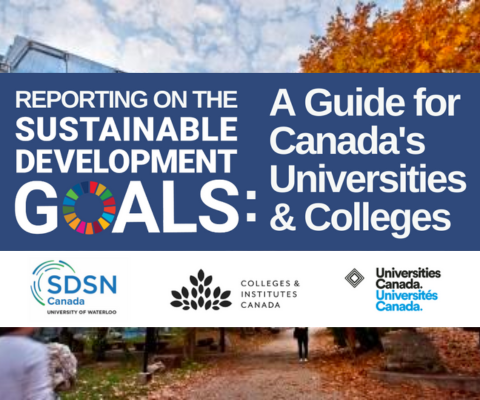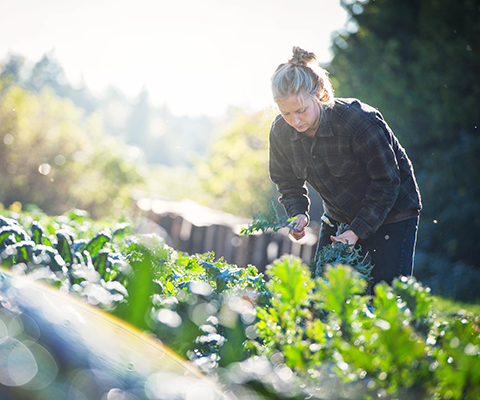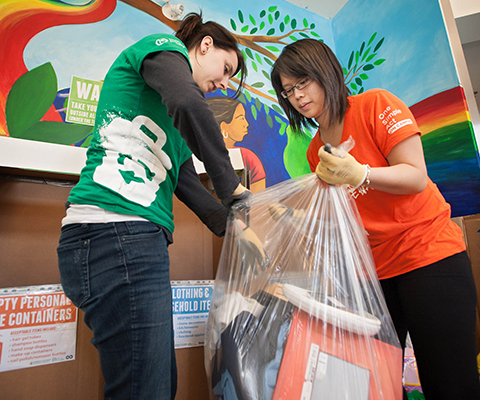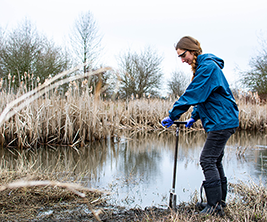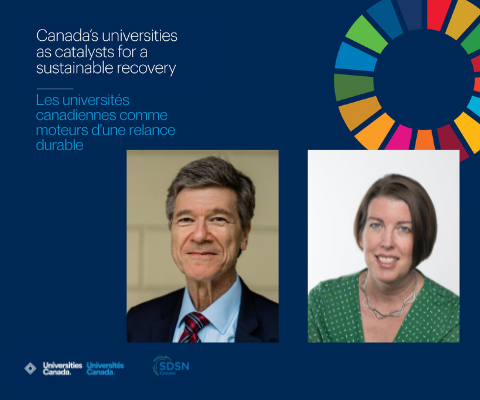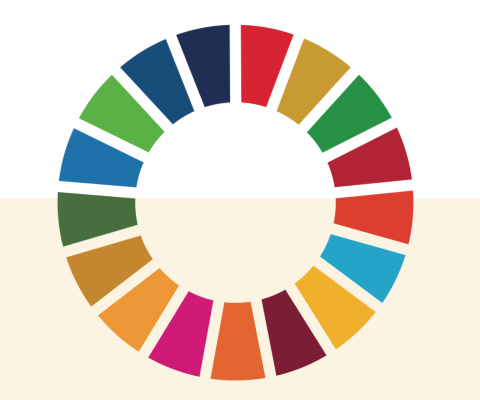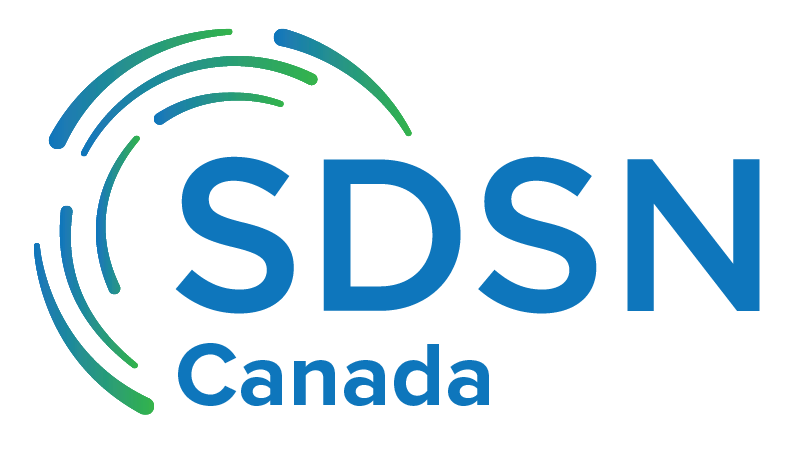Sustainable Development Goals
Overview
In 2020, Universities Canada embarked on a pan-Canadian initiative focused on increasing awareness of SDG projects on Canadian campuses and connecting stakeholders through cross-university and university-community partnerships that bridge efforts across sectors and embrace The 2030 Agenda for Sustainable Development. Supported by the federal government’s SDG funding program, this initiative explores how Canadian universities are integral to a global movement to advance the United Nations SDGs with practical solutions for sustainable development through diverse activities and institutional commitments.
Universities and other higher education institutions have a critical role in helping society achieve the SDGs through leadership, research, teaching and learning, campus operations. Education and research are explicitly recognized in several SDGs, and universities have a direct role in addressing these key focuses.
15 of the most research-intensive universities in Canada have signed A Charter for Canadian universities: Investing to Address Climate Change
Of the 17 Sustainable Development Goals, SDG 4 is dedicated to quality education. However, universities can contribute to the SDGs much more broadly by supporting the advancement of all the goals as well as the implementation of the SDG framework itself by adopting new behaviours, influencing decision-making and accelerating transition.
From university leaders to faculty members, to students – everyone’s unique contribution to this process is critical for the success of Agenda 2030. This initiative is the first step towards unifying pan-Canadian university efforts to drive the 2030 Agenda.
By raising awareness, connecting university leaders, and mapping the SDG landscape, this project will provide a strong foundation for concrete action towards achieving the SDGs. Engaging with the SDGs will also greatly benefit universities by helping them demonstrate their social impact, capture demand for SDG-related education, build new partnerships and access new funding streams. Actions driven by SDGs define a university as socially aware and accountable.
Advancing the SDGs
Examples from across the country
-
End poverty in all its forms everywhere
End poverty in all its forms everywhere
University of Windsor
A team from the University of Windsor’s Faculty of Engineering has partnered with Habitat for Humanity Windsor-Essex to build Canada’s first 3D-printed homes for residential use. The project seeks to help address a vital need for a more affordable and environmentally sustainable housing market.
Researchers, graduate students and laboratory technicians will 3D print concrete segments on a large-scale, industrial printer and test them exhaustively for strength, sustainability and durability to ensure they are safe for residential use. Researchers estimate that once these construction processes are perfected, multiple homes can be printed within a few days and at a much lower cost than traditional housing.
Queen’s University
The Promise Scholars program at Queen’s University is a comprehensive initiative designed to reduce financial barriers and increase access to Queen’s for local, first-generation students. The program provides dedicated financial, academic, and career support to help students complete their degree.
Carleton University
Carleton University’s Community First: Impacts of Community Engagement (CFICE) project includes a Poverty Reduction Hub which studied how different players tackle poverty through community-campus partnerships. The goal was to understand how people from different areas of the community could work together to address the root causes of poverty. In collaboration with several community partners, the PR Hub also funded community-driven demonstration projects and provided research support aimed at reducing poverty.
University of Toronto
The Reach Project is a student-led, faculty-driven, multi-disciplinary research initiative dedicated to investigating the pathways to success for innovative development programs. The initiative’s mission is to pursue the full achievement of the SDGs by equipping and empowering the next generation of global leaders to create knowledge and inspire action on reaching the hardest to reach.
-
End hunger, achieve food security and improved nutrition and promote sustainable agriculture
End hunger, achieve food security and improved nutrition and promote sustainable agriculture
Lakehead University
Lakehead University’s Sustainable Food Systems Lab is a hub for academics and community-based practitioners engaged in sustainable food systems research and action. It is a collaborative event and workspace and a resource for researchers, practitioners, and activists. It aims to build meaningful relationships that enable knowledge sharing between research, policy and practice with an ultimate goal of healthy, just and sustainable food systems for all.
Ryerson University
Enactus Ryerson created Project Growing North to implement sustainable geodesic greenhouse units in Northern communities in Canada. Each unit has the capacity to feed the nutritional requirements for every family in the community, at a fraction of the current price, while creating local jobs. In each community, partnerships are created with local schools, where students will begin to learn about horticulture, and have weekly visits to the greenhouse to gain a tangible educational experience.
Concordia University
Concordia is home to countless initiatives that contribute to SDG 2. For example, some student-led initiatives are: Campus Potager, City Farm School, Le Frigo Vert, People’s Potato, Concordia Farmers’ Market, and the Hive Café Solidarity Cooperative. In addition, the Concordia Food Coalition brings together students, faculty and staff to promote and facilitate a transition to a more sustainable food system at the university.
-
Ensure healthy lives and promote well-being for all at all ages
Ensure healthy lives and promote well-being for all at all ages
University of British Columbia
UBC’s Faculty of Medicine has partnered with the Stellat’en First Nation and Village of Fraser Lake on a Remote Communities Drone Transport Initiative. This pilot project examines how drone technology can be used to improve access to healthcare supplies in rural and remote Indigenous communities.
During the one-year pilot study, drones will initially carry prototype packages between the Village of Fraser Lake and Stellat’en First Nation. Once the flights are proven successful, the drones will transport laboratory samples, medical supplies and medications, allowing community members greater access to supplies and services without needing to leave their home community. The initiative will serve as a scalable model with the learnings obtained transferable to enable the introduction of drone transport programs in other rural, remote and Indigenous communities to improve access to healthcare supplies and services across B.C. and Canada.
University of Toronto
The University of Toronto’s Dalla Lana School of Public Health will lead a major interdisciplinary research and education initiative in line with SDG 3 to promote Universal Health Coverage through equitable health system strengthening. This focus draws on the university’s strengths in quality of care, data systems and analytics, health information systems, health policy and comprehensive health systems and implementation science.
Brock University
Brock University’s Lifespan Development Research Centre uses a network of multidisciplinary individuals and community agencies that are devoted to researching human development across the lifespan with specific strengths in children and adolescence. They are currently working on the Brock Healthy Youth project, which investigates health risked behaviours in adolescent brain development.
In addition, Brock University is committed to raising awareness and reducing the stigma around mental health, and Brock is dedicated to ensuring all students, staff, faculty, and employee family members have access to health, safety, and wellness programs.
McMaster University
Placed 14th in the world in the Times Higher Education Impact Rankings for its efforts to advance the SDGs in 2021. McMaster placed fourth in the world and first among Canadian universities for SDG 3.
-
Ensure inclusive and equitable quality education and promote lifelong learning opportunities for all
Ensure inclusive and equitable quality education and promote lifelong learning opportunities for all
École de technologie supérieure
A joint initiative between ETS’ sustainable development team and the TribuTerre sustainable development student committee, Le génie pour la société conferences look to highlight the role that engineering plays in society.
Because it educates students that will go on to play a major role in transforming the future our world, ETS Montréal believes it is crucial to connect its students with a wide range of speakers that will encourage students to reflect on their professional choices and to build a society that is more resilient and respectful of its resources. The conferences address topics such as the urban agriculture, constructing sustainable buildings, and urban planning and mobility in the context of pandemic.
Mount Royal University
Mount Royal University offers a novel credited course, Humanly Information Design, in their Bachelor of Communication, Information Design. For the past three years, the senior Information Design students used a system thinking approach to examine the SDGs.
University of Guelph
Principles for Responsible Management Education (PRME), 27 of Universities Canada’s member’s business and management schools are members of the UN-supported Principles for Responsible Management Education (PRME) initiative. Working through Six Principles, PRME engages business and management schools to ensure they provide future leaders with the skills needed to balance economic and sustainability goals, while drawing attention to the SDGs and aligning academic institutions with the work of the UN Global Compact.
For example, Guelph University’s Gordon S. Lang School of Business and Economics has a commitment to the United Nations SDGs with their Sustainable Business Initiative and are PRME Champions.
University of Calgary
Campus as a Learning Lab (CLL) is an innovative University of Calgary initiative with a focus on experiential learning and fostering a campus culture rooted in sustainability. Learning labs enable campuses to be active environments for teaching and learning, while enabling the co-production of knowledge and increasing the ability of an institution to contribute to sustainability challenges. Through CLL, the University of Calgary is using its campus as a lab to test and model innovative sustainability practices, leveraging its research, academic and operations functions.
Kwantlen Polytechnic University
KPU is committed to supporting social justice through the United Nations Sustainable Development Goals Open Pedagogy Fellowship where faculty can work across institutions to maximize global impact. Each fellowship team designs renewable assignments and deploys them in their classes. Then, a student showcase takes place following the course to share the SDGs projects with the broader community.
-
Achieve gender equality and empower all women and girls
Achieve gender equality and empower all women and girls
Queen’s University
The Dunin-Deshpande Queen’s Innovation Centre (DDQIC) and Compass North programs at Queen’s University enable students and local women entrepreneurs to build sustainable start-ups through courses, workshops, internships, seminars, conferences, and competitions.
Western University
Western University supports SDG 5, through its Gender Equality Network; its Go ENG Girl and Go CODE Girl programs to introduce girls in grades 7-11 to engineering, coding, and related STEM fields; its Trans Care Team which provides medical care and counselling to students in an LGBTQIA2S+ affirmative environment; and the Women of Ivey Network (WIN) which engages and connects Ivey alumnae to share in women-focused initiatives and creates a community dedicated to supporting and advancing women in leadership roles.
York University
The Entrepreneurial Leadership and Learning Alliance (ELLA) is a program led by York University in partnership with the Small Business Enterprise Centres of Markham, Richmond Hill, Vaughan and York Region. This is a key example of how York University is working to empower women entrepreneurs and reduce the gender equality gap.
-
Ensure availability and sustainable management of water and sanitation for all
Ensure availability and sustainable management of water and sanitation for all
York University
Researchers from York University’s Faculty of Environmental and Urban Change are working on a diverse range of projects with local and global partners, including the Ecological Footprint Initiative, which tracks human consumption of renewable resources around the world; The Waste Wiki, that houses data to inform waste management decisions; and a global database project that tracks water quality in more than 12,000 freshwater lakes. Their students can take part in any of the 500+ sustainability-related courses on York’s Toronto campuses or study for a semester at its EcoCampus in Costa Rica.
Ryerson University
Ryerson Urban Water (RUW) is a multi-disciplinary collective of over 40 experts across 6 faculties and 13 Departments. Its researchers and their wet labs and students come from the natural sciences, engineering, policy/regulatory, and social science arenas. Experts are working on water capture strategies including green roofs and urban forests, low impact development and municipal master planning, engineered wetlands and sophisticated wastewater mitigation strategies, and cost-benefit economic strategies. RUW has the expertise necessary to ensure the development of resilient sustainable cities.
University of Manitoba
A member institution of the United Nations Academic Impact (UNAI) and was named a UNAI Hub in 2018 for its work and research related to SDG 6. The Hub has been conducting interdisciplinary research on water systems to help build sustainable, resilient communities in Manitoba and across Canada, including research with Indigenous communities, management of water quantity and quality issues, and the impact of climate change on our water systems.
-
Ensure access to affordable, reliable, sustainable and modern energy for all
Ensure access to affordable, reliable, sustainable and modern energy for all
University of Northern British Columbia
UNBC’s Bioenergy Plant, the flagship component of the UNBC Energy Initiative, is a biomass gasification system designed by Vancouver-based Nexterra Systems Corp. The Bioenergy Plant uses gasification to convert sawmill residue into useable heat in the form of hot water. The hot water is distributed through its existing hot water district heating system and has offset roughly 85% of the fossil fuels previously used to heat the core campus buildings. This reduction has helped UNBC work towards its energy policy goals of reducing the fossil fuel consumption for space heating of all UNBC campuses by 80% by 2015.
University of Regina
The Clean Energy Technologies Research Institute (CETRI) centralizes all low-carbon and carbon-free clean energy research activities at the University of Regina. Areas of research focus include decarbonization and zero-emission hydrogen (H2) technologies, carbon (CO2) capture and utilization, and waste-to-renewable fuels and chemicals. Bringing together one of the most dynamic teams of researchers, industry leaders, innovators, and educators in the energy field, CETRI’s mission aligns with the Environment & Climate Action areas of focus in the University of Regina’s 2020-2025 Strategic Plan.
University of British Columbia
UBC’s Bioenergy Research Demonstration Facility is a first of its kind project in North America. The system processes renewable biomass to generate thermal energy for heating campus buildings. It reduces UBC’s reliance on fossil fuels, provides a quarter of campus heating needs, and eliminates 14% of campus greenhouse gas emissions. In addition, a 2MW cogeneration engine uses Renewable Natural Gas to generate over 5% of the power for UBC’s electrical grid, while waste heat from the electrical generation process is also used for heating buildings. The BRDF is a signature Campus as a Living Laboratory project, integrating UBC’s core academic mandate of research and teaching with our district infrastructure, all within a facility that is a showcase for cross-laminated-timber products made in British Columbia (CLT).
Dalhousie University
Dal’s Agricultural Campus has its sights set on being completely carbon neutral — a goal highlighted at the opening of the new Biomass Energy Plant in 2018. The renewed plant and district energy system burns biomass fuel in a thermal oil heater. This heat moves a new 1 MW turbine to create electricity — an organic rankine cycle system that is the first of its kind on a North American university campus. This technology places Dal on the leading edge of sustainable technology and renewable energy practices.
-
Promote sustained, inclusive and sustainable economic growth, full and productive employment and decent work for all
Promote sustained, inclusive and sustainable economic growth, full and productive employment and decent work for all
York University
Many universities have adopted procurement policies that consider how the process of purchasing goods and services can positively impact the social well-being of communities, reduce poverty, promote economic and social inclusion, and support local economic development and social enterprise.
York University has committed to using its purchasing power to benefit local economies and to provide fair access to its procurement services by providing additional opportunities to underrepresented businesses and communities. Through its Social Procurement Policy, it seeks to increase the number of employment apprenticeship and training opportunities for people from the University’s local neighborhoods, other equity-deserving communities and Indigenous people, and to broaden York’s supply chain by providing diverse vendors with equitable access to tender opportunities to foster inclusive economic growth.
McMaster University
McMaster University’s School of Labour Studies offers certificates, undergraduate and graduate programs for students seeking careers in law, community development, policy analysis, teaching, research and more, while its Institute for Work in a Global Society (WIGS) research group brings a social science perspective to issues of concern to paid and unpaid workers.
McMaster also participated in Hamilton’s Living Wage group, a coalition of labour, academic and social services convened to determine the community’s living wage for a family of four.
University of Alberta
Sustainability Scholars was founded by the University of Alberta and the City of Edmonton to sponsor graduate students working on applied research projects with Edmonton-area institutions. Since 2015, it has grown to include close to a dozen municipal, corporate and institutional partners. Scholars have worked on climate action plans, energy improvements in affordable housing, wildlife tracking, ground-breaking energy storage, green building standards, and more. As a result, real progress is made to shift the Edmonton area toward sustainability and climate resilience.
The University of Alberta’s Adaptation Resilience Training (ART) project helps Alberta prepare for the impacts of a changing climate. ART offers students full time, paid positions for a period of 6 to 8 months to allow them to gain early career experience working with skilled professionals on real-world adaptation issues. Project assistants help host organizations understand and manage their climate change risks and support adaptation-related activities. Host organizations include businesses, governments and non-profits involved in water management, infrastructure, community planning and agriculture.
-
Build resilient infrastructure, promote inclusive and sustainable industrialization and foster innovation
Build resilient infrastructure, promote inclusive and sustainable industrialization and foster innovation
Ontario Tech University
Ontario Tech University’s office of Campus Infrastructure and Sustainability promotes sustainable infrastructure throughout their campus, with a strong emphasis on innovation. Ontario Tech has the largest geothermal system in Canada, with 1500 tonne Borehole Thermal Energy Storage System. This system links to the buildings to minimize heating, ventilation and air conditioning demands on these buildings.
Université de Montréal
Several innovative projects have been carried out in recent years by the Université de Montréal, including its MIL campus ephemeral projects, the Darlington Ecological Corridor and the L’extension centre. Other major projects will come to fruition in the years to come, such as the redevelopment of the university’s principal campus, which will be greener and more open to the surrounding.
Wilfrid Laurier University
Wilfrid Laurier University’s sustainable campus infrastructure initiatives include: the Laurier Energy Efficiency Program (LEEP) to increase the energy efficiency of its buildings (including the installation of rooftop solar panels, battery storage and a fully functioning microgrid); its in-house waste reduction and recycling programs, and the newly constructed Lazaridis Hall which is LEED (Leadership in Energy and Environmental Design) gold certified and incorporates environmental features such as solar panels, an accessible green roof and an electric vehicle charging station.
Saint Mary’s University
The Centre of Excellence in Accounting and Reporting for Co-operatives (CEARC) at Saint Mary’s University have set out to answer the question: How is the Canadian co-operative sector contributing to Canada’s measurement and reporting on SDG impact? Working with co-operatives and mutuals across Canada that are interested in how they can implement the SDGs in their corporate environment, this project will help co-operatives and mutuals understand the impact of, and increase knowledge and action regarding, the SDGs in the co-operative sector.
Université de Sherbrooke
L’Université de Sherbrooke is one of only two Canadian institutions with a Platinum STARS rating from the Association for the Advancement of Sustainability in Higher Education (AASHE). The Sustainability Tracking, Assessment & Rating System (STARS) is a self-reporting framework for colleges and universities to measure their sustainability performance and platinum is the highest and most prestigious rating. STARS has recently aligned its methodology with the UN SDGs framework.
-
Reduce inequality within and among countries
Reduce inequality within and among countries
Dalhousie University
Dalhousie University’s Resilience Research Centre hosts the Child and Youth Refugee Research Coalition (CYRRC) which is composed of over one hundred academics, education and service provider organizations (ESPO), and federal and provincial government representatives committed to promoting the successful integration of refugee children and youth in Canada.
The Coalition’s aim is to better understand factors threatening young refugees’ integration and to translate research into policy and practice to support successful resettlement. One of the Coalition’s main thrusts is to generate research and tools that respond directly to service provider priorities. The Coalition’s activities are gathered into four research clusters: Broader Economic, Social and Political Factors; Language, Literacy and Learning; Social Integration, Human Rights, Culture and Security; and Child, Youth & Family Wellbeing.
University of Lethbridge
EleV is an innovative partnership between the Blackfoot Confederacy, the University of Lethbridge and the Mastercard Foundation which creates new educational opportunities for Indigenous youth and bolsters supports to ensure their success, increasing employability and enhancing economic development in Blackfoot communities.
EleV works to improve transitions to post-secondary, increase student success at the University of Lethbridge and expand work-integrated learning opportunities. It will also launch new initiatives to deliver programs in Blackfoot communities, create opportunities for students to participate in activities at the University, enable additional Blackfoot and Indigenous students to attend uLethbridge and enhance Indigenous student services in each of the Blackfoot communities.
Breaking down barriers to education for former youth in care
Many Universities Canada members across the country, such as the University of Winnipeg, Mount Saint Vincent University, Vancouver Island University and Memorial University, break down barriers to university education for former youth in care by providing bursaries, tuition waivers, or dedicated financial supports for students in or aging out of foster care.
University of Waterloo
Promoting the SDGs through Canadian First Nations treaties is a research project that seeks to address the pressing needs disproportionately felt by First Nations communities across Canada by analyzing whether and how selected modern treaties respond to the SDGs across key sectoral areas: social, environmental and economic. This research seeks to inform Indigenous leaders, policy makers, academics, and interested parties of the rights and obligations set out in 15 selected modern First Nations treaties across Canada in relation to the 17 SDGs.
-
Make cities and human settlements inclusive, safe, resilient and sustainable
Make cities and human settlements inclusive, safe, resilient and sustainable
Institut National de la Recherche Scientifique
The Labo Climat Montréal is a living lab research collaboration designed to investigate and improve adaptations to climate changes in the Montreal neighbourhoods of Lachine and Villeray-Saint-Michel-Parc-Extension. This work is done is partnership with experts and members of the local community.
Thompson Rivers University
The Skeetchestn Indian Band has initiated partnerships with Tk’emlúps te Secwépemc (TteS) and Thompson Rivers University (TRU) to create an innovative partnership that teaches Indigenous students how to run a business using traditional and Western land practices, and food sovereignty through the Applied Sustainable Ranching (ASUR) Certificate.
Students learn skills around regenerative agriculture, traditional and cultural land use practices including grazing management, riparian management, invasive species, managing soils, biodiversity and financial/business management. Elkstwewc ne tmicw will fill some much-needed gaps in the Skeetchestn community, where the band owns three ranches that are leased out or not in use because there aren’t enough community members with the knowledge or support to make them sustainable and profitable.
HEC Montréal
HEC Montréal’s urban agriculture project, Hectare urbain, is a living laboratory which includes a forest garden, an heirloom vegetable garden and an educational beehive – all grown using permaculture principles. The green spaces of the project are located around and on the roof of the University’s Côte-Sainte-Catherine building. The project also includes a pedagogical dimension, encouraging staff, students and members of the local community to think about food chain issues, climate change and how we can preserve biodiversity. It is hailed for its innovative approach and its mentorship program aimed at introducing local elementary school students to permaculture.
Summer school
During the summer of 2021, CIRODD and its partners will hold their first Summer School on Societal Transformation. The school’s objective, which will be delivered over a 45-hour period, is to develop key competencies for the achievement of UN’s SDGs at the municipal level for up to 50 change-driven leaders drawn from both the public and private sectors. CIRODD’s academic and educational partners for this summer school are Acadia University, Concordia University, the EDS Institute of Laval University, the Maison de l’innovation sociale and SDSN Canada. CIRODD is also collaborating with the Université du Québec à Chicoutimi and is based at l’École de technologie supérieure.
-
Ensure sustainable consumption and production patterns
Ensure sustainable consumption and production patterns
ETS
The ETS Center for Intersectoral Studies and Research on the Circular Economy (CISRC) seeks to contribute to the creation and deployment of a circular economy through cutting-edge interdisciplinary scientific research and innovation, education and training, dialogue with stakeholders, and added value and knowledge transfer.
Trent University
Trent University defines sustainable agriculture as creating a food system that is responsible, justice-oriented, efficient, effective, and viable. It is about farms that can produce food sustainably, as well as humane working conditions, ethical treatment of animals, living wages, fair prices, profitable business models, conservation of biodiversity, resource stewardship, healthy diets and food sovereignty in Indigenous communities. Trent’s Sustainable Agriculture and Food Systems (SAFS) Program examines each of the links between farm and table, and their implications for people, the economy, and the planet and teaches students about the challenges and benefits of producing and distributing healthy, affordable food in sustainable ways, while preparing them for a career in which they really effect change.
Responsible procurement and purchasing policies: Universities across the country have committed to responsible consumption through their strategic plans and their policies and guidelines related to sustainability, procurement, and purchasing.
For example, sustainability is one of six foundational pillars of OCAD’s Academic plan 2017-2022, with the university committing to fostering a culture of sustainability in every facet of OCAD, including curriculum, operations, community and administration. The university also has a standalone sustainability policy and commits to maintaining environmentally responsible and sustainable procurement practices as part of its procurement policy.
University of Regina and Luther College
In 2018, the International Association of Universities (IAU) chose these two institutions in Saskatchewan to lead the research cluster for SDG 12 until 2030. The SDG 12 cluster is composed of seven satellite partner universities from around the world. The IAU research clusters promote the Whole Institution Approach – embedding sustainable development concepts and principles at all levels of university operations.
-
Take urgent action to combat climate change and its impacts
Take urgent action to combat climate change and its impacts
University of Winnipeg and University of Regina
ClimateWest is a non-profit organization and a regional hub for climate services in Manitoba, Saskatchewan, and Alberta, which empowers people, communities, businesses, and governments to address risks and opportunities caused by a changing climate. It is co-founded by the University of Winnipeg’s Prairie Climate Centre (PCC), the International Institute for Sustainable Development (IISD), and the University of Regina’s Prairie Adaptation Research Collaborative (PARC) with support from the Governments of Manitoba, Saskatchewan, and Alberta, as well as Environment and Climate Change Canada. The organization’s mandate is to deliver credible, useful, and timely climate information, data, and tools tailored to the Prairie region in support of positive adaptation to climate change.
Royal Roads University
The Cascade Institute at Royal Roads University is a Canadian research center that addresses the full range of humanity’s converging environmental, economic, political, technological, and health crises. Using advanced methods to map and model complex global systems, it identifies and helps implement high-leverage interventions that could rapidly shift humanity’s course towards fair and sustainable prosperity.
Université Laval
Laval is the first university in Québec to reach carbon neutrality. Since 2015, the Laval campus has been carbon neutral by reducing greenhouse gas emissions at the source and by offsetting the emissions it cannot eliminate.
University of British Columbia
Ranked third in the world for SDG 13 in the 2021 Times Higher Education Impact Rankings. In 2020, President Ono established a Climate Emergency Task Force comprised of students, faculty and staff to gather ideas from the UBC community and propose recommendations to address the climate emergency. Student mobilization and advocacy by groups such as Climate Justice UBC, the UBC Climate Hub and others were instrumental in UBC’s divestment action and the establishment of the Climate Emergency Declaration.
-
Conserve and sustainably use the oceans, seas and marine resources for sustainable development
Conserve and sustainably use the oceans, seas and marine resources for sustainable development
Memorial University, Dalhousie University, and University of Prince Edward Island
A historic partnership of Memorial University, Dalhousie University and the University of Prince Edward Island, the Ocean Frontier Institute is a collaborative research initiative that seeks to improve prediction and mitigation of major storms, manage human activities as they relate to ocean resources, improve the potential for fisheries and aquaculture industries to meet global seafood demand in a sustainable manner, strengthen marine safety, and transform how we monitor the ocean with new data capture and IT tools.
University of Victoria
The Salish Sea Hub builds community-university partnerships that contribute to decolonization and local action towards the UN SDGs. It is one of 13 hubs in the world initiated by the international network Knowledge for Change (K4C), an initiative of the UNESCO Chair in Community Based Research and Social Responsibility in Higher Education. The Salish Sea Hub has a particular focus on building community-based research capacity and action towards decolonization, racial and gender equality, and climate action.
University of New Brunswick
As one of Canada’s only marine biology programs, UNB goes the extra mile to provide a unique experience for students. Based at the Huntsman Marine Science Centre in St. Andrews, the Marine Fall Semester is an intensive, 12-week immersion semester offered on a biennial basis, in a marine setting. It provides students with a “hands-on” study experience of diverse marine organisms, including mammals (whales and seals), algae, fish and invertebrates.
-
Protect, restore and promote sustainable use of terrestrial ecosystems, sustainably manage forests, combat desertification, and halt and reverse land degradation and halt biodiversity loss
Protect, restore and promote sustainable use of terrestrial ecosystems, sustainably manage forests, combat desertification, and halt and reverse land degradation and halt biodiversity loss
Bishop’s University
As part of its 2020-24 Sustainable Development Plan, Bishop’s University has begun the first phase of its tree planting project to plant 10,500 trees throughout the campus. The university is situated on a unique, 550-acre campus which features many beautiful natural habitats and is committed to ensuring the sustainability of the traditional Abenaki land and ecosystems under its stewardship.
The tree planting project will benefit both the campus community and the local community, contributing to the sustainability of their ecosystem through carbon sequestration to help reduce the impact of greenhouse gas emissions; water retention and absorption to help mitigate recurring flooding risks on the site; the restoration of fragmented forest cover to allow wildlife to circulate more safely; and the rehabilitation of forest habitat previously lost to human activity.
Algoma University
The Department of Geography, Geology & Land Stewardship at Algoma University hosts a Taking Care of our Land Symposium, the fourth iteration of which will be held in May 2023. The purpose of the symposium is to explore, through research and best practices, the inclusion of cultural and traditional practices of land management, planning, and use for Aboriginal communities in Northern Ontario. Past symposiums have included sessions on issues such as forest management, invasive species, decolonizing land use planning, traditional ecological knowledge and forest herbicides, and using community science to help understand disturbances in the Boreal forest of Eastern Canada.
Vancouver Island University
Vancouver Island University’s Mount Arrowsmith Biosphere Region Research Institute (MABRRI) is a centre for collaborative research, innovation, and knowledge sharing that elevates the relationship between people and nature on Vancouver Island and within the Mount Arrowsmith Biosphere Region. MABRRI’s projects include Wetland Mapping in the Regional District of Nanaimo, promoting the SDGs in the Mount Arrowsmith Biosphere Region, and Coastal Forest Plant Phenology Research.
University of Alberta and University of Calgary
The Canadian Mountain Network (CMN) was established in 2019 to support the resilience and health of Canada’s mountain peoples and places through research partnerships based on Indigenous and Western ways of knowing that inform decision-making and action. Supported by Canada’s research granting agencies with contributions from diverse partner organizations, this funding represents a once-in-a-generation opportunity to position Canada as a global leader in mountain systems research at a time when Canada’s mountain systems are undergoing rapid and uncertain change.
-
Promote peaceful and inclusive societies for sustainable development, provide access to justice for all and build effective, accountable and inclusive institutions at all levels
Promote peaceful and inclusive societies for sustainable development, provide access to justice for all and build effective, accountable and inclusive institutions at all levels
University of Victoria
The University of Victoria is home to the world’s first Indigenous law degree program. Students of the program graduate with two professional degrees: a Juris Doctor (JD) and a Juris Indigenarum Doctor (JID). They study Canadian law, Indigenous legal traditions, governance, environment and attend field schools to learn from community experts and work with the community on law-related projects. Through these experiences, they explore the diversity of Indigenous legal traditions and observe first-hand the ways Indigenous legal processes are being used today.
The University is also home to the Indigenous Law Research Unit (ILRU), an academic research institute dedicated to the revitalization of Indigenous law and governance. It seeks to create sites of respectful dialogue and collaboration to reinvigorate communities of Indigenous legal practice locally and globally. It believes that the revitalization of Indigenous laws and governance is essential to re-building deliberative democracy and healthy citizenries in self-governing, lawful communities.
Western University
Western’s Centre for Urban Policy and Local Governance (CUP-LG) was created in 2017 to respond to many new challenges faced by local governments and urban policymakers. The University is also home to Community Legal Services which provides free legal services to low-income people in the London community and to Fanshawe College and Western University students. Services are provided by over 125 law students per academic year, who work under the supervision of experienced staff lawyers.
Simon Fraser University
Ranked 5th in the world for SDG 16 in the 2021 Times Higher Education Impact Rankings. SFU Public Square, a signature initiative designed to spark, nurture and restore community connections, establishes Simon Fraser University as the go-to convener of thought-provoking and productive conversations about issues of public concern. More than a single place or program, SFU Public Square assembles the hearts, minds, and talents of diverse communities to promote inclusive, intelligent, and inspiring dialogue. SFU Public Square events and offerings proclaim SFU’s vision to be Canada’s leading community-engaged research university.
-
Strengthen the means of implementation and revitalize the global partnership for sustainable development
Strengthen the means of implementation and revitalize the global partnership for sustainable development
University of Victoria
The Salish Sea Hub builds community-university partnerships that contribute to decolonization and local action towards the UN SDGs. It is one of 13 hubs in the world initiated by the international network Knowledge for Change (K4C), an initiative of the UNESCO Chair in Community Based Research and Social Responsibility in Higher Education. The Salish Sea Hub has a particular focus on building community-based research capacity and action towards decolonization, racial and gender equality, and climate action.
University of Saskatchewan
In its internationalization plan, also known as the International Blueprint for Action 2025, the University of Saskatchewan highlights its commitment to enhancing the supply and sustainability of global water, energy, and food supplies, as well as to promoting the health and the protection of the environment.
Its international office offers internal project grants to initiate or strengthen existing research collaborations with international partners as well as to support new and existing collaborations and engagement with communities to improve welfare and quality of life.
McGill University
The McGill Sustainability System Initiative (MSSI) developed a Sustainability Collaboration Dashboard using data provided by faculty members to visualize McGill’s research and collaborations in the area of sustainability. The dashboard also provides data on publication impact, visualises publication collaborations between MSSI members by year, and matches MSSI member research to the United Nations Sustainability Development Goals.
University of Waterloo
The Sustainable Development Solutions Network in Canada (SDSN Canada), hosted at the University of Waterloo, is part of a global SDSN movement to build a network of universities, colleges, research centres, and knowledge institutions to promote practical solutions for sustainable development. SDSN Canada’s mission is to mobilize Canadian scientific and technological expertise to facilitate learning and accelerate problem solving for the UN’s Agenda 2030 and the SDGs.
Blog
News
Spotlight on
Universités Canada est fière d’être membre du Réseau des solutions de développement durable du Canada (SDSN Canada).
By the Numbers
-
38%of Canadian Universities
include the SDGs in one of their main strategies as of the beginning of 2021.
-
40%of Canadian Universities
have participated in the Sustainability Tracking Assessment and Rating System (STARS) since 2010.
-
15Canadian universities
ranked among the top 100 in the world in The Times Higher Education 2021 Impact rankings.
Resources
- A Guide for Advancing the Sustainable Development Goals in your Community: A brief regarding SDG and local community engagement from Tamarack Institute.
- The SDG Guidebook and Toolkit: A Community Foundation Resource on the United Nations Sustainable Development Goals from Community Foundations Canada.
- SDG Toolkit for Canadian Colleges and Institutes: A practical guide to the United Nations Sustainable Development Goals for post-secondary institutions from CICAN.
- SDSN SDG Guide: Getting Started with the Sustainable Development Goals From SDSN.
- 17 Rooms: A new approach to spurring action for the Sustainable Development Goals from the Center for Sustainable Development at Brookings and The Rockefeller Foundation.
- Accelerating Education for the SDGs in Universities: This is a guide specifically dedicated to universities, colleges, and educational institutions Sustainable Development Solutions Network.
- Getting Started with the SDGs in Universities: A guideline for the first steps in the implementation of the SDGs from Sustainable Development Solutions Network.
- Times Higher Education 2021 Impact Rankings: A tool that measures universities performance based on SDGS from Times Higher Education.
- Mobilizing Youth for the Sustainable Development Goals: A reference for higher education students who want to engage with the SDGs on their campus from Reimagine17
This project is funded in part by the Government of Canada’s Sustainable Development Goals Funding Program
Moving forward together: Canada’s 2030 Agenda National Strategy
